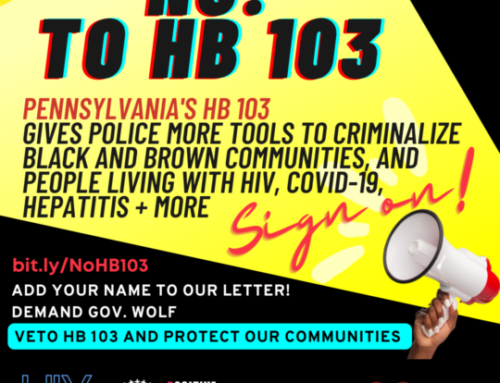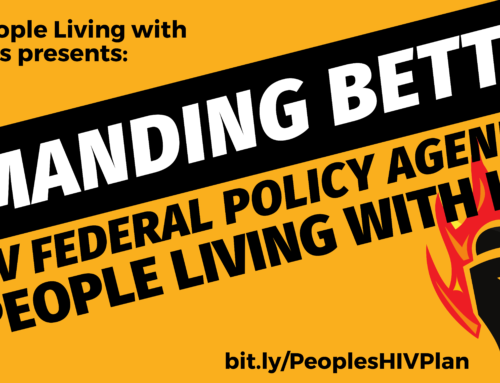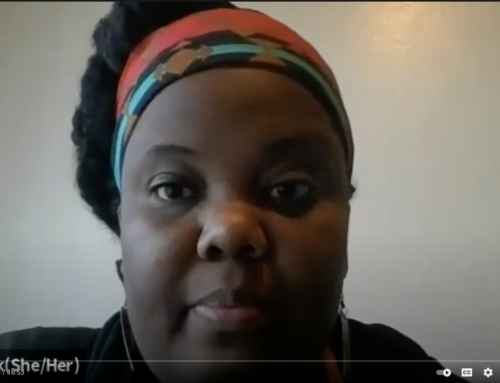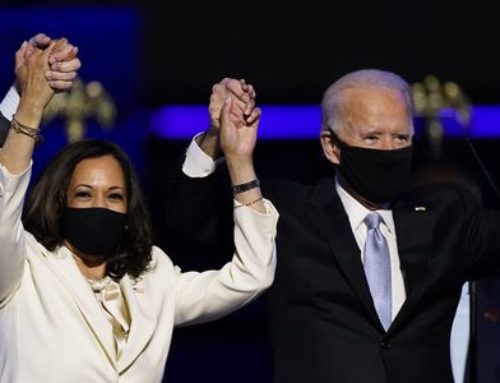FOR IMMEDIATE RELEASE
March 13, 2018
Contact:
Cecilia Chung, San Francisco, CA 415.902.0216 | cecilia.chung@me.com
Larry Walker, Atlanta GA 443.703.6082 | larry@thrives.com
Naina Khanna, Oakland, CA 510.681.1169 | nkhanna@pwn-usa.org
Andrew Spieldenner, San Diego, CA 323.620.3432 | aspieldenner@gmail.com
Over 50 organizations stand in strong opposition to holding the 2020 International AIDS Conference in San Francisco, as was announced today. Every single U.S.-based national network of people living with HIV supports this letter which was sent to the International AIDS Society yesterday, along with many other organizations (see list below). Sign on to support the letter here.
We urge the International AIDS Society to reconsider this decision and to identify alternative venues in Low and Middle Income Countries (LMICs).
We detail the reasons for our strong opposition below. However, we cannot overemphasize this point: Under the policies and political climate of the current federal leadership in the United States, it is impossible to honor the five values of IAS by hosting AIDS 2020 in the U.S. at this time. We refuse to stand by while those most affected by HIV within and outside of the U.S. are, at best, excluded and, at worst, put in harm’s way by holding the conference in San Francisco.
As noted by over 200 signatories to a letter released at this month’s CROI conference, “science shows us that we can defeat HIV, but not if we defy evidence.” Hosting AIDS 2020 in the U.S. flies in the face of ample and undeniable evidence that the Trump administration’s violation of human rights, targeting of vulnerable communities for harm, and exacerbating HIV-related stigma worldwide, coupled with drastic budget cuts, threatens the advancements we have made in the domestic and global epidemics.
As members of frequently marginalized communities, we did not come to this position lightly. Having a conference on U.S. soil can appear to open up access and opportunity for greater participation by U.S.-based advocates. However, as described below, this is only true to a very limited extent.
Because of safety and ethical concerns, it would necessarily exclude vulnerable communities and most people impacted by the HIV epidemic from around the globe, as well as many scientists, clinicians, researchers, public officials and providers.
We anticipate that the U.S. political climate will only be worse in 2020, in the final months of a presidential election year that, like 2016, may well be marked by heightened violence, intentional promotion of stigma and the need to mobilize to protect our communities.
We are gravely concerned about the ability of the most vulnerable communities globally impacted by HIV to participate in a U.S.-based conference in 2020. History shows that local, state or even federal officials cannot guarantee the human right for safe travel of marginalized groups.
As you know, the 1998 conference was relocated from Boston to Amsterdam, due to U.S. travel restrictions on PLHIV. In 2010, President Obama lifted those restrictions for PLHIV, which allowed IAS to host AIDS 2012 in Washington, DC. However, despite significant advocacy, the Obama administration failed to lift the travel restrictions on sex workers and people who use drugs for AIDS 2012.
Because sex workers could not get permission to enter the U.S., the Global Network of Sex Workers (NSWP) hosted a satellite conference in India during AIDS 2012 and the director of Desiree Alliance, a national sex workers rights organization in the U.S., chose to boycott the conference. Thus, one of the most marginalized communities affected by HIV was unable to participate in a global conference due to restrictions by the host country. This was, and is, unacceptable.
It is completely predictable that conditions for those seeking entry for AIDS 2020 will be demonstrably worse. As advocates working on federal U.S. HIV policy, we believe it will be impossible to lift the travel restrictions on sex workers and people who use drugs during this administration, which has also recently added travel restrictions for people from Muslim-majority countries and some Latin American countries. Additional restrictions are likely forthcoming before July 2020.
These restrictions cannot be lessened, waived or altered by state or local elected officials in California or any state. That is not how the U.S. government works.
The U.S has become increasingly militarized in its approach to immigrants, and Immigration and Customs Enforcement (ICE) is specifically targeting California, due to its failure to comply with Trump administration policies on undocumented immigrants. In the last two weeks, 150 immigrants were detained and arrested in the San Francisco Bay Area alone. On March 7, 2018, U.S. Attorney General Jeff Sessions announced a federal lawsuit against California for attempts to provide sanctuary to immigrants. Deportations under the Trump administration have particularly targeted immigrants who use drugs, and the President has held up extra-judicial killings of people who use drugs as a good model to follow.
Local authorities have little ability to protect against anti-immigrant or travel policies, regardless of their commitments and personal politics. The Bay Area, like everywhere else in the United States, is not safe at this time.
In addition, the International AIDS Conference is prohibitively expensive (registration in 2018 ranges from $500 USD for low income countries to $1200 USD; the cost is likely to be higher in 2020), and scholarships are limited. Registration fees do not include accommodations. This is problematic because the San Francisco Bay Area is one of the U.S.’ most expensive markets for housing, accommodations, and meals. It is at present in a literal housing crisis, with thousands sleeping on the streets and under freeways, even through the winter. There are few affordable hotel rooms or AirBnBs within an hours’ commute of San Francisco. The availability of affordable room rentals is only projected to get worse over the next two years. Thus, participation in a Bay Area-based conference will be unaffordable and inaccessible for the vast majority of U.S. advocates who most need to attend.
But the conference itself is just the culmination of a time-and-resource-intensive process. If San Francisco is selected as the location for AIDS 2020, much of US-based advocacy by communities of color and PLHIV for the next two years would necessarily become focused on opening access to the conference for our communities. We would need to target the conference organizing process itself, to ensure that content, representation, and leadership is relevant and meaningful to our communities. This was challenging and time-consuming during the preparations for AIDS 2012, under far more favorable political conditions. It would be a diversion of our scarce resources, ultimately harming, not helping, our work.
Hosting AIDS 2020 is an uninvited imposition for most of the U.S. HIV community, given the multiple and urgent threats to safety, health, rights, and dignity we face. Advocates are fighting daily for our very survival: to protect the Affordable Care Act, Medicaid (upon which 44% of US PLHIV rely), sexual and reproductive rights, immigrant safety, rights of transgender people and members of LGB communities, global funding for the HIV and TB response, and facing a national opioid overdose epidemic that affects people living with HIV and HCV.
IAS 2020, if held in the U.S., will only serve as a distraction during a critical period where the domestic HIV community needs to be laser focused on protecting what we have and advancing access to healthcare, the safety net, and human rights. We reject the fantasy that the benefits of possibly heightened U.S. media attention to HIV issues in July 2020 outweigh the burden that hosting the IAS conference in the U.S. imposes on advocates who are fighting year-round to elevate these issues.
Further, the current Administration has openly demeaned and insulted people living with HIV and people from countries affected by the epidemic with such statements as ‘everyone from Haiti has AIDS’ and naming African countries as “shitholes”. It is irresponsible to suggest that the U.S. will be safe for people from other countries in 2020, especially those from the communities most affected by HIV.
Traditionally, the conference rotated to distinctly different parts of the globe for reasons of equity in access and perspective. Consequently, an alternative location in Low and Middle Income Countries should be sought.
Some have argued that the conference’s presence in the Bay Area will increase investment in or focus on the Bay Area HIV community. We question whether increasing investment in the San Francisco Bay Area should really be the top global or even the top domestic priority, given the geographic distribution of the respective epidemics. Additionally, the Bay Area and its elected officials are far from useful political targets in 2020. California is already widely viewed as an outlier for federal government priorities.
Based on our experience with AIDS 2012 in Washington, DC, we question whether there would be any positive lasting impact in the most vulnerable local communities – particularly for those who live in Oakland. Despite advocacy, organizing and significant fundraising to support access for U.S. PLHIV, the majority of U.S. PLHIV and low income communities who were able to participate in 2012 were relegated to solely attending the free part of the AIDS 2012 – the Global Village.
Whether by design or not, some San Francisco organizations appear to have placed hosting a multi-million dollar conference above ensuring that the people who most stand to benefit from this conference, globally and domestically, can, in fact, participate and benefit.
It is extremely disappointing that the IAS supported the bid. Perhaps IAS members are unaware that among the fourteen biggest cities in the U.S., San Francisco has the lowest percentage of Black residents, although the greatest burden of the US epidemic lies in Black American communities.
We understand that Oakland, where more people of color living with HIV reside, has been included, in part, as a means of “diversifying” the bid, but the historic divide between San Francisco and the rest of the Bay Area has deepened further in recent years as San Francisco has aggressively gentrified. Further, it is our understanding that main conference activities will take place in San Francisco and Global Village activities are proposed to take place in Oakland, a minimum 20-minute car or public transit ride away. This is offensive and risks exacerbating and reinscribing existing race and class inequities, while presenting barriers for people who are differently-abled or unable to access transportation.
If San Francisco organizations and advocates are keen to support the next International AIDS Conference, and to give meaningful attention to the racial and class disparities that allow some PLHIV to live long healthy lives while others die, we urge these organizations to commit the resources they have have mobilized for this bid to support a Global South city to host the conference.
In solidarity with PLHIV, sex workers, people who use drugs, disenfranchised communities and citizens from all the countries President Trump has insulted or banned, we stand in strong opposition to the U.S. as a host country for AIDS 2020.
We urge the U.S. HIV community, and all those working for justice across targeted and marginalized communities, to stand with us and demand the conference be removed from US soil and relocated. When travel restrictions have ended and the U.S.’ record on human rights and immigrant safety has improved, we ask IAS to choose a location in the U.S. South as a potential host location, as it is the geographic region that bears our greatest burden of the epidemic domestically yet suffers from the most severe inequities in access and political will.
Signed,
List in formation. Sign on here.
Organizations:
ACO
Advocates for Youth
African and Black Diaspora Global Network on HIV and AIDS, Toronto, Canada
African Institute for Research and Sustainable Development
African Sex Workers Alliance
AbeniOC
AIDS Alabama
AIDS Foundation of Chicago
Alianza Popular Translatina Americana
ATHENA Initiative
Arianna’s Center
Bailey House
Berkeley Free Clinic
Canadian HIV/AIDS Legal Network
Center for Health and Gender Equity (CHANGE)
Colorado Organizations and Individuals Responding to HIV/AIDS (CORA)
CounterNarrative Project
Drug Policy Alliance
Desiree Alliance
Empowerment Program
Estonian Network of People living with HIV
GGD Amsterdam
Global Forum on MSM and HIV (MSMGF)
GloballyAware
Harm Reduction Action Center (HRAC)
Harm Reduction Coalition
HIPS
HIV Education and Prevention Project of Alameda County
HIV Modernization Movement – Indiana
Hispanic Health Network
HIV Justice Network
HIVenas Abiertas
House of Blahnik, Inc.
Housing Works, Inc.
International Community of Women Living with HIV Asia Pacific (ICWAP)
International community of women living with HIV Eastern Africa (ICWEA)
International Community of Women Living with HIV- Global
International Community of Women Living with HIV – North America
Jovenes LGBT Mexico
Lady BurgAndy
Latino Commission on AIDS
Latinos in the Deep South
Los Angeles County HIV Drug & Alcohol Task Force
Love To Love Organization
Minority AIDS Council of Orangeburg, Bamberg and Calhoun Counties
Mississippi Positive Network
Muslim men living with HIV in Kenya
My Fabulous Disease
National Working Positive Coalition
Occupy Bergen County
Positive Iowans Taking Charge (PITCH)
Positively Trans
Positive Women’s Network-USA
Positive Women’s Network-USA Colorado region
Positive Women’s Network-USA Dallas Fort Worth region
Positive Women’s Network-USA Greater Houston region
Positive Women’s Network-USA Louisiana region
Positive Women’s Network-USA South Carolina region
Positive Women’s Network-Rwanda
Positively Mindful CIC
PowerSource Tucson
Prevention Access Campaign
Project Prosper of Florida
Projekt Information e.V.
Red Umbrella Project
Rights4Change
Rise Above Counseling Services
Sero Project
SexWorkerFest SF
Sisterlove, Inc.
Southern AIDS Coalition
Southerners on New Ground (SONG)
Stella, l’amie de Maimie
Stroll
SWOP Behind Bars
SWOPUSA
SWOP Orlando
SWOP Sacramento
The Empowerment Program
Thrive Alabama
THRIVE SS
Transgender a National Alliance (+TNA)
Transgender Law Center
Transitions Louisiana
TransLatin@ Coalition
Trans Masculine Advocacy Network
Trans Queer Liberation Movement
Treatment Action Group (TAG)
Unity Fellowship of Christ NYC
US People Living with HIV Caucus
Viva Women
We Are Dancers
What Works Association
Women’s Health in Women’s Hands Community Health Centre, Toronto, Canada
Woodhull Freedom Foundation
Individuals:
Willie Ablao
Alex Andrews
Akilah Benton
Matilda Bickers
Maxx Boykin
Reginald Brown
Barb Cardell
Jada Cardona
Marco Castro-Bojorquez
Philomene cyulinyana
JD Davids
Dazon Dixon Diallo
Penny DeNoble
Dr. Carrie Foote
Olivia Ford
Susan Forrest
Annette Gaudino
Bryn Gay
Terl Gleason
Grissel Granados
Mark Grantham
Tami Haught
Bryan Heitz
Kristen Hirsch
Christian Hui
Devin Hursey
Solobia Hutchins
Rashayne Johnson
Pat Kelly
Naina Khanna
Keiko Lane
Octavia Lewis, MPH
Michael Luciano
Tiommi Jenae Luckett
Timothy Lunceford-Stevens
Loris A Mattox
Suraj Madoori
Jesse Maley
Derrick Mapp
Shari Margolese
Mary Elizabeth Marr
Butch McKay
Megan McLemore
Erin Meek
Jim Pickett
Tana Pradia
Laurie Priddy
Sonia Rastogi
Mel Rattue
Venita Ray
Morey Riordan
Chris Roebuck, PhD, MPH
Nestor Rogel
Douglas Rose
Andrew Spieldenner, PhD.
Lee Storrow
Sophia Strachan
Sean Strub
Jamie Tafoya
Wangari Tharao, Toronto, Canada
Laura Thomas
Jenna Torres
Masonia Traylor
Evany Turk
Meg Valleee
Prizila Vidal
Dafina M. Ward, JD
Guy Vandenburg
Terri L. Wilder
Liaam Winslet
Erica Woodland








I agree absolutely with the analysis – but just to point out – it was the 1992 (not the 1998) conference that was moved to Amsterdam – see more here for the reason… http://icaso.org/the-triple-a-blog-aids-2018-amsterdam-activism/